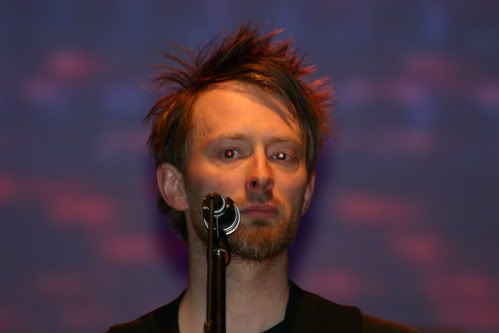Thom Yorke
The Eraser
XL
2006
A-
Thom Yorke always makes his first line of any album feel incredibly instructive, particularly if you deem it as a question posed to the listener. The Eraser is no different: "Excuse me but I have to ask / Are you only being nice because you want something?" You see, even when he was downplaying breakup rumors and soft-pedaling promotion, Yorke wasn't worried that you wouldn't like The Eraser. He's worried people won't give The Eraser the close listen it deserves.
It's actually a valid concern. He knows that there's a large contingent of people who will simply put a gold star on The Eraser in hopes that with a final IDM binge, he's exorcised the wayward muse preventing him from remaking The Bends.
But the joke's on them; if it's black holes and revelations you want, look no further. While this certainly hews closely to expectations of what a Thom Yorke solo record would sound like, he follows his paranoia into the abyss and comes out with the most song-oriented album he's made since you-know-what.
Listeners won't find themselves on terrain that's too alien, as The Eraser acts as a centrifuge that siphons off Yorke's contributions to latter-day Radiohead: modal chord changes, Mobius strip melodies, blocky piano, drum sounds that get turned into tempura. If The Eraser is indeed a travelogue of Yorke's psyche, the first half proves it's a concrete jungle in there. It's one of the least psychedelic albums ever made—timbres tend to fall within a narrow spectral range between ash and steel. And yet these cold, gray slabs of sound create a humid, all-encompassing atmosphere that begins as alienating but ultimately becomes familiar.
Yorke's earned the benefit of the doubt over the years, and The Eraser rewards it. It certainly sounds monochromatic on first try, but close listens reveal intriguing details crawling about; tongue clicks, wood blocks, twitchy shakers, and undulating serpents of bass among them. Moreover, it proves that Yorke's melodic sense hasn't disappeared, but rather, it's just as effective because of its subversive nature, not in spite of it. After the wall-of-Yorke echoes on the opening title track, "Analyse" follows breathlessly on its heels with a seductive, near-tropical sway. "Black Swan" is the easiest entry point for toe-dippers. A swampy, hypnotic take on Radiohead's riff-based material, Yorke offers subtly ingratiating "ice age coming" frustration ("You have tried to please everyone / But it just isn't happening") and typically sly humor ("I don't care what the future holds / I'm not even up to date").
The Eraser's more immediate and intense second half is a twenty-minute highlight reel, following in the vein of Radiohead's most successful electro foray ("Idioteque"). "Atoms for Peace" feels like a milestone, a culmination of Yorke's long-standing desire to create lost love songs for the Richard D. James Album. On an album that reverses Yorke's tendency to meld into his band's sumptuous racket, "Atoms for Peace" is not only a standout, but one of Yorke's bravest vocal performances yet.
The apex is reached on "Harrowdown Hill," which parlays its false-start baggy beat into synthed-out high drama. A rather literal take on the mysterious, scandalous death of British weapons inspector David Kelly, it certainly comes equipped with enough Wikipedia depth to make it a message board bombshell. But you wouldn't need to know any of it to recognize it as Yorke's "angriest song." On record, Yorke's political displeasure has always seemed more borne out of timeless Orwellian paranoia than current events, but the topicality of "Harrowdown Hill" in no way narrows its main point: activism is a bitch. In character, he quavers "don't walk the plank like I did," before offering the unifying, salient thought of everyone who's ever felt the futility of conservatism: "We think the same things at the same time / We just can't do anything about it." Hail to the Thief did more than its share of preaching to the choir, but stripped of Radiohead's expectations of creating godlike music, Yorke rediscovers ground-level hopes and frustrations and becomes beautifully humanized.
If there are those who will unconditionally love The Eraser, there's just as big of a faction that will pummel the album with the sort of vitriol it would never deserve if some guy named Dom Bourque made it. I thought I was going to be one of them. I'll be honest; before I got my hands on the actual work, I assumed that this was going to be a referendum on how Ed O'Brien and Johnny Greenwood were somehow still incredibly underrated guitarists and that Nigel Godrich has become the most important band "member" since Thom started writing lyrics by throwing pieces of paper into a hat. But The Eraser is a triumph, and I'm left wondering why I expected otherwise. Maybe it was intended to temper expectations for Radiohead's new era under Spike Stent, but as is, it will always be a stunning final word for one of our generation's most reliably innovative partnerships.
Reviewed by: Ian Cohen
Reviewed on: 2006-07-10
A-
http://www.stylusmagazine.com/reviews/thom-yorke/the-eraser.htm
